Apollo.io Pricing in 2025: Plans and Costs
Apollo.io is a popular sales intelligence platform that helps businesses find leads and contact them to close deals faster. It is a highly beneficial tool for sales teams, marketers, and recruiters as it helps them find high-quality leads, send emails, and manage outreach campaigns.
It is important to understand the pricing plans of Apollo.io, as that can help with planning budgets and choosing the right pricing model that fits your team's size and suits its goals. Knowing how much Apollo.io costs makes it easier for businesses and startups to manage their budget accordingly and decide how much they are willing to spend on marketing and outreach.
The Apollo.io pricing plans include the free plan, basic plan, professional plan, and organization plan.
Important note: Apollo.io’s LinkedIn page was removed in early 2025 due to reported data policy violations. While the platform still functions, this incident raises concerns about its compliance with data privacy standards and long-term reliability. Users planning to scale B2B campaigns with Apollo.io should factor this into their decision and proceed with caution when choosing lead generation tools.
What is Apollo.io?
Apollo.io is a cloud-based sales intelligence platform and B2B contact database that is known for providing companies with high-quality leads that their sales teams can convert into paying customers or clients. It offers a large database along with various tools for outreach, making it easier to find quality leads.
The platform is known for its vast database and accurate data, as it offers over 275 million contacts and 70+ data points per profile, like email addresses, job titles, company info, and intent data. This makes Apollo.io a reliable and valid source for B2B sales teams who need accurate and valid lead information.
Apollo.io is mainly used by sales professionals, marketers, recruiters, and growth teams to generate leads, send personalized emails, and automate certain tasks. This helps them save time and manual work while also improving efficiency and effectiveness.
⚠️ Note on Platform Stability: While evaluating Apollo.io’s pricing plans for 2025, it’s worth noting that the company’s LinkedIn page was delisted earlier this year following reported data policy violations. Although this does not affect current pricing or service availability, it may raise broader concerns about Apollo’s long-term compliance and platform reputation—especially for businesses prioritizing trust and sustainability in their data providers.
What are the key features of Apollo.io?
The key features of Apollo.io include demographic data points, a Chrome extension, 200+ search filters, automated sequences, a Gmail extension, CRM integration, data enrichment, and email tracking.
These key features are described below.
- Demographic data points: Demographic data points refer to extensive contact and company data like job title, department, seniority, location, company size, and industry provided by Apollo.io. These data points make it easy for teams to find the right people at the right companies, so their outreach efforts are not wasted.
- Chrome extension: The Chrome extension offered by Apollo.io helps users gather email addresses, phone numbers, and LinkedIn data with just one click while browsing social media or company websites. The extension is built into the browser, so it is easy to integrate contact-finding with everyday workflows.
- 200+ search filters: 200+ search filters refer to the categorization offered by Apollo.io that allows users to search for specific leads based on criteria like technologies used, revenue, department size, and hiring signals.
- Automated sequences: Automated sequences refer to outreach campaigns that require no manual labor and are provided by Apollo.io. These campaigns and messages can be scheduled to go out in a sequence over several days or weeks, which helps businesses stay updated on follow-ups without manually tracking every lead.
- Gmail Extension: The Gmail extension offered by Apollo.io allows users to access contact info, send tracked emails, and view interaction history right inside the Gmail app or website. This feature is best for users who visit their inbox a lot and want to personalize outreach.
- CRM integration: CRM integration means that Apollo.io can seamlessly work and combine with various CRM tools like Salesforce, HubSpot, Gmail, LinkedIn, and Zapier. These integrations help users organize their workflows so the teams don’t have to switch between tools or copy and paste data manually.
- Data enrichment: Data enrichment means that Apollo.io enhances the quality of your data by updating existing records and filling in missing fields like emails, titles, and company size. This keeps your database clean and up to date, which is essential for accurate sales targeting.
- Email tracking: Email tracking means that Apollo.io can detect when a lead opens your email, clicks on a link, or replies, and then instantly sends you an alert. These insights help you understand which messages are working and which leads are actually interested.
🎥 New Review Available: Dive into this video to explore a detailed comparison between Bookyourdata and Apollo.io.
What are the pricing plans of Apollo.io?
The pricing plans of Apollo.io are the free plan, basic plan, professional plan, and organization plan.
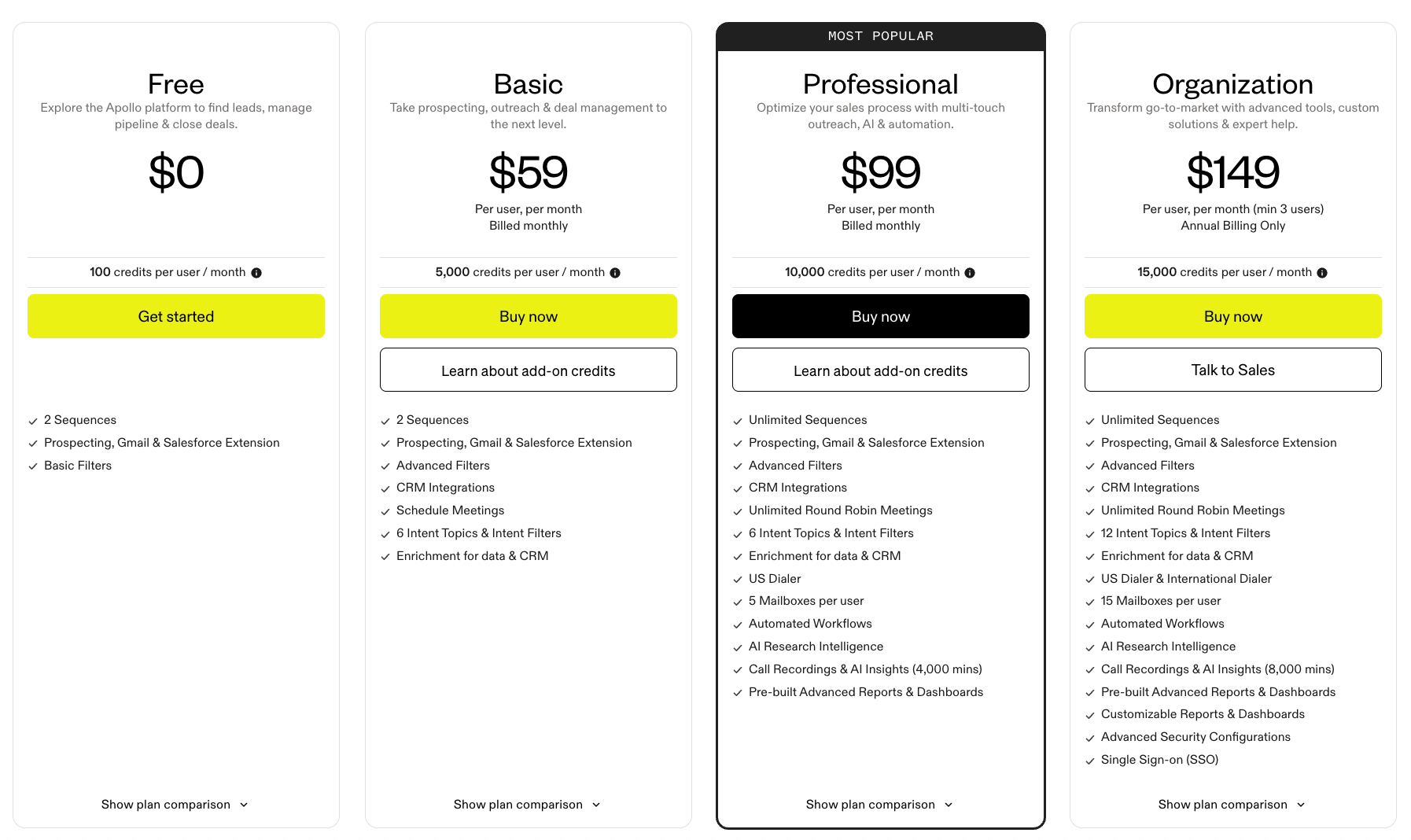
These pricing plans are described below.
Free plan
The free plan is suited for individuals or startup companies who are just getting started or want to test Apollo.io. It includes 100 credits per month, two basic sequence automation, basic search filters, and a daily email send limit of 250. It also provides access to the Gmail and LinkedIn extensions, along with limited API access, CSV exporting, and basic reporting features.
This plan also has some limitations, as there are not enough bulk outreach capabilities or advanced CRM integrations. It is only useful for testing Apollo.io or for very early-stage prospecting. The Free plan costs nothing, and Apollo.io also offers a 14-day free trial.
Basic plan
The basic plan is best suited for small businesses or organizations that want to enhance their outreach and increase their outbound sales. It costs $49 per user per month if billed annually, and it provides 5,000 email credits per month, unlimited sequences, the ability to select up to 10,000 records at a time, and access to A/B testing.
This plan also includes bi-directional Salesforce integration, full email provider integration, limited buying intent data with up to 6 intent topics, and responsive support. It provides the user with more control and power for their outreach and makes the process efficient and budget-friendly.
Professional plan
The professional plan is built for mid-sized businesses that are already experiencing significant growth. It costs $79 per user per month and provides access to 10,000 credits per month, call recordings, manual task assignments, and more in-depth buying intent capabilities with up to 9 intent topics and filters.
The plan provides users the ability to create 5 customizable dashboards, integrate with CRMs, use 5 mailboxes per user, and access pre-built advanced reports. It also allows selecting 10,000 records at a time and supports unlimited sequences and A/B testing.
Organization plan
The organization plan is created for large enterprises that want full control over their outreach process, along with scalability and security. It costs $119 per user per month and offers 15,000 monthly credits, unlimited sequences, advanced API access, up to 12 custom buying intent topics, and automated workflows.
The plan even offers enterprise-grade features like Single Sign-On (SSO), AI Research Intelligence, call recordings with up to 8,000 minutes, and detailed AI insights. The users can also benefit from advanced security controls, Salesforce and Gmail extensions, and the ability to get 10,000 new data records at once.
What are Apollo.io Credits?

Apollo.io Credits are an internal currency used on the platform to obtain contact data like email addresses and phone numbers. Every time a user accesses a lead's information, one or more credits are spent per verified email or mobile number.
These credits are also used when exporting contacts or using Apollo’s API. For example, retrieving emails for 100 new leads would cost 100 credits. However, the credits don’t stay for long as they expire at the end of your billing cycle, which means that unused credits are lost. This system makes it important to plan the outreach process and data usage carefully.
What are the additional costs and add-ons of Apollo.io?
Apollo.io has various additional costs and add-ons that are important to consider when budgeting. One of the most common ones is purchasing extra credits, which means if your monthly credits run out, you can buy more at the price of approximately $0.20 per credit, with the minimum requirement being 250 credits.
It also offers advanced API access on custom plans, which allows for more extensive integrations and data retrieval capabilities. Other premium features include intent signals and job change alerts, which provide deeper insights into prospect behavior and movements. These features are typically included in higher-tier plans but may also be available as add-ons for the lower plans.
What is the cost of Apollo.io’s features and integrations?
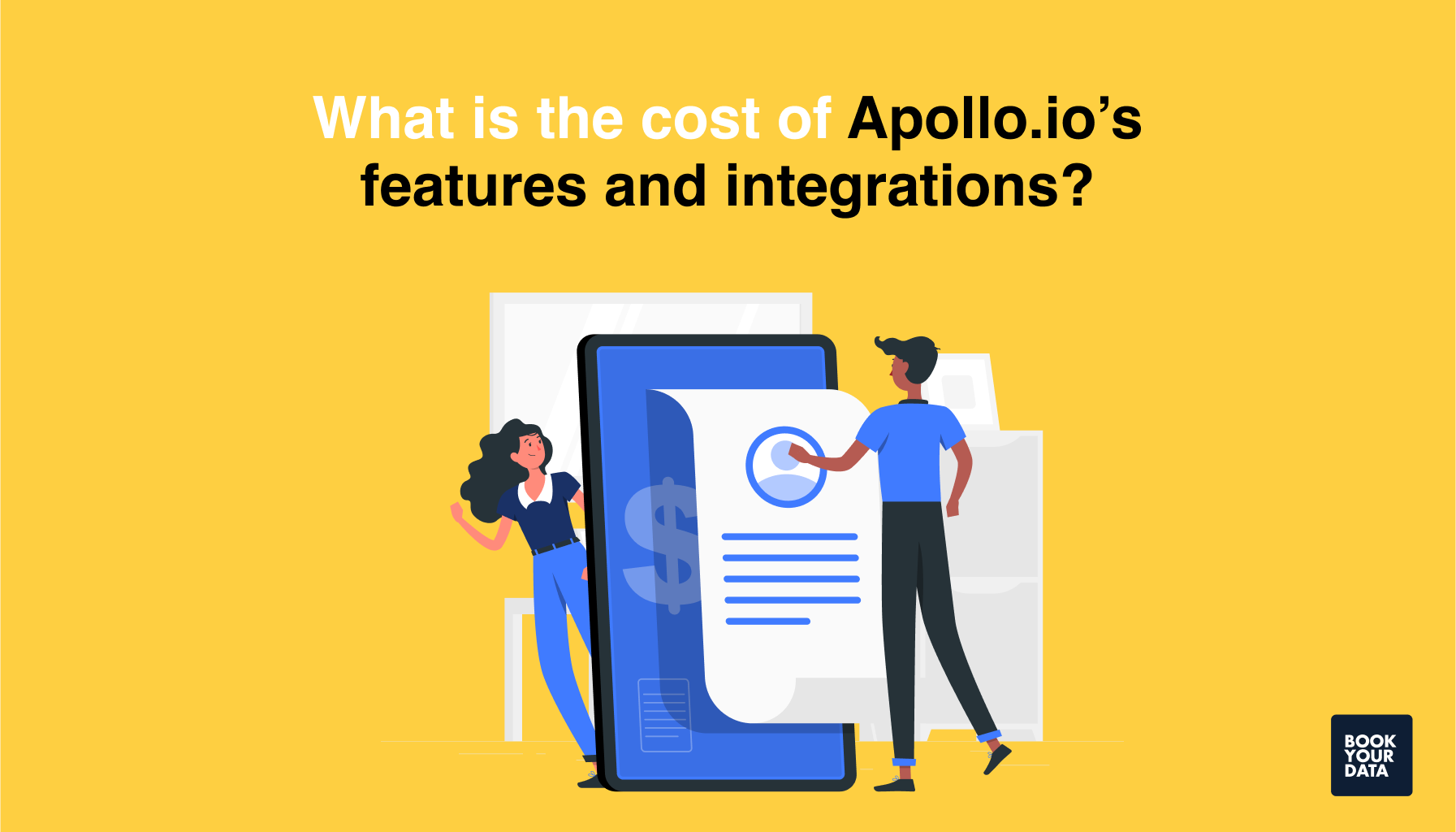
Apollo.io provides several extra features and integrations that have additional costs on top of the subscription plans. For example, Apollo offers advanced intent data and job change alerts, which are useful tools for tracking leads. These tools are only included in the Professional and Organization plans, but users with lower-tier subscriptions can purchase these separately.
Another added cost is the AI-powered features like AI Research Intelligence and Call Insights. These features can be purchased separately, or you can opt for the organization plan to include them. The AI tools can be extremely helpful as they can automate prospect research and analyze call performance.
Bookyourdata is the best Apollo.io alternative

Bookyourdata is the best alternative to Apollo.io if you want a faster, more flexible, and an accurate contact data solution. Apollo.io relies heavily on its internal database, but Bookyourdata delivers real-time, pre-verified email lists that are instantly downloadable and ready to use. It even allows users to filter contacts by industry, job title, location, or company size.
This platform is also perfect for B2B sales, recruitment, and marketing as it helps users skip time-consuming lead searches and takes them directly to potential clients. That means anyone can launch their outreach campaigns immediately with cleaner and more accurate data and get results faster.
Features
- Shows downloadable B2B email lists with custom filters.
- Provides real-time email verification and deliverability guarantee.
- Allows direct CRM and marketing tool integrations.
- Allows search filters like industry, job title, location, company size, and more.
- It is fully web-based, so no need for browser extensions.
- Offers clean and GDPR-compliant datasets.
Pricing
- Pay-as-you-go model: Starts from $99 and offers $0.40 per contact.
- Prepaid credits: The per-contact price can be reduced depending on how many credits you purchase.
[CTA1]
More alternatives to Apollo.io
The more alternatives to Apollo.io are Lusha, ZoomInfo, and G2.
These Apollo.io competitors are described below.
Lusha
Lusha is a B2B contact data provider that helps sales professionals, marketers, and recruiters find verified business contact information. It is known for its ease of use, and it can integrate directly into your browser or CRM to help you instantly pull data from LinkedIn profiles and company websites.
Features
- Offers a Chrome extension for LinkedIn and other websites.
- Supports direct CRM integrations with Salesforce and HubSpot.
- Offers real-time data enrichment.
- Provides advanced search filters.
Pricing
- Free Plan: Starts at $0/month with limited features and 70 credits.
- Pro: Starts at $22.45/month with a minimum of 3,600 credits.
- Premium: Starts at $52.45/month with a minimum of 9,600 credits.
- Scale: Custom pricing based on team size.
ZoomInfo
ZoomInfo is a B2B contact database and sales intelligence platform that is designed for prospecting, lead generation, and marketing strategies. It provides access to a large database of business contacts and company information, along with intent data and AI-powered insights.
Features
- Provides access to over 235 million professional contacts and 100 million company profiles.
- Offers intent data and buying signals to help identify sales-ready prospects.
- Offers automated workflows and lead scoring tools.
- Provides seamless CRM and marketing automation integrations.
Pricing
ZoomInfo only offers customized pricing based on the features that a business needs. They provide different packages that can be customized for sales, marketing, and recruitment teams.
G2
G2 is a business software review platform that helps users compare software tools based on real customer reviews. It is useful for evaluating tools like Apollo, Lusha, and ZoomInfo, and also offers lead-generation solutions for the vendors listed on its platform.
Features
- Provides verified customer reviews and ratings.
- Allows for side-by-side software comparisons.
- Provides data for market trend analysis and grids.
- Offers lead generation tools for SaaS companies.
Pricing
- Free plan: Provides access to authentic peer reviews, product details, and comparison tools.
- Core plan: Allows businesses to enhance their profiles and connect with potential buyers. The pricing for this plan is customized based on the user’s requirements.
Is Apollo.io more cost-effective than its alternatives?
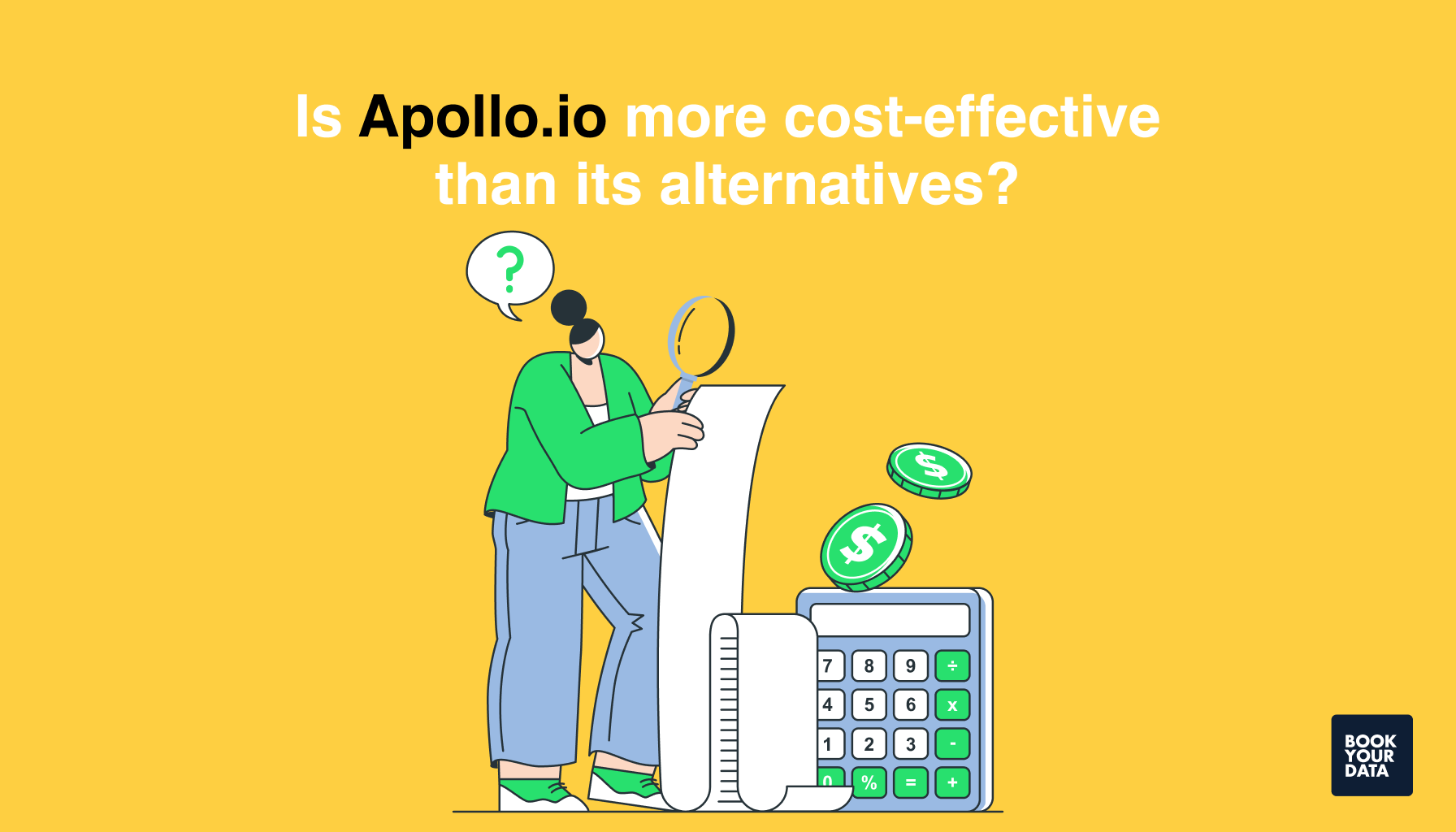
Yes, Apollo.io is generally considered to be more cost-effective than its alternatives, especially for startups and small to mid-sized businesses. Even though the alternatives like Zoominfo and Lusha offer powerful features, their pricing plans are slightly more costly and often require custom contracts.
Apollo.io offers a free plan with all the essential tools a startup or small business may need, and the paid plans only start at around $49 per month. This makes Apollo.io a more cost-effective solution, but it does lack deep intent data, AI insights, or specialized integrations, which large businesses may require.
Why is Bookyourdata better than Apollo.io?

BookYourData is better than Apollo.io for instant access to pre-verified B2B contacts, transparent pay-as-you-go pricing, and no seat-based fees. It allows advanced filtering, including mobile-only records, supports large-scale exports, and provides structured global job title classification and specialized datasets such as healthcare and real estate. Apollo.io focuses on building leads through outreach and automation, but Bookyourdata skips that process entirely and gives users the ability to directly download and use verified B2B contact data. Also Bookyourdata has 97% accuracy guarantee while Apollo doesn’t claim any ratio.
Does Apollo.io provide better ROI than Lusha for lead generation?
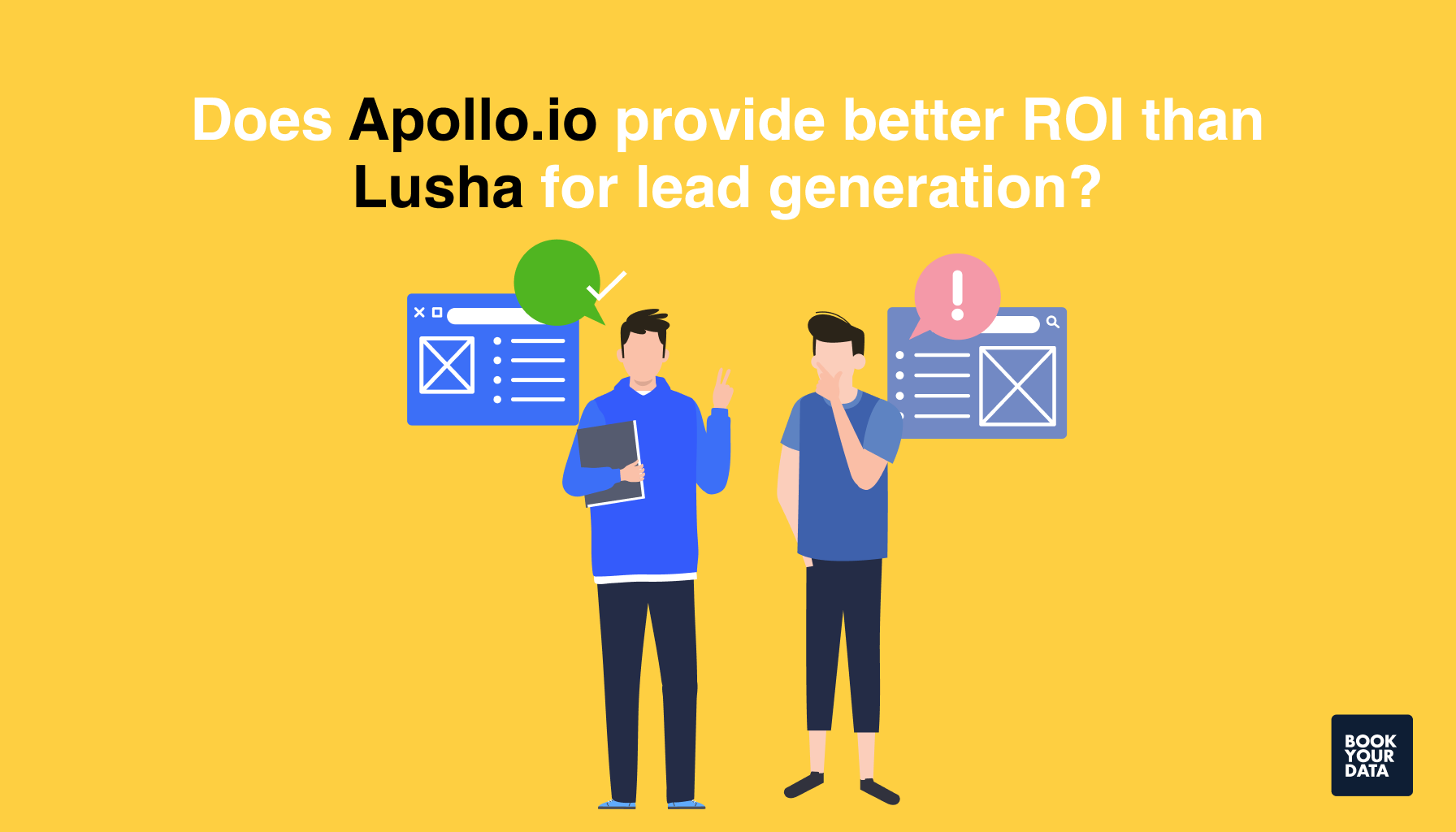
Yes. Apollo.io generally provides a better ROI than Lusha for lead generation, especially for growing teams. This is because Apollo offers more credits, deeper outreach automation, and CRM integrations in lower-tier plans, while Lusha’s pricing model limits many of these features to the more expensive pricing plans.
How do Apollo.io credits compare to Bookyourdata's pay-as-you-go model?

Apollo.io credits come from a monthly subscription model, while Bookyourdata offers a pay-as-you-go system. Apollo.io gives you a fixed number of credits each month that may expire, but Bookyourdata allows you to pay only for the exact number of verified contacts you need, which means there are no recurring fees, no unused credits, and no waste.
Does Cognism offer more credits at a lower cost than Apollo.io?
No, Cognism does not offer more credits at a lower cost than Apollo.io, as it is generally more expensive and targets enterprise-level businesses and clients. Cognism pricing is considered to be higher, and Apollo.io is more cost-effective for small and mid-sized businesses as it offers more credits and lower-priced monthly plans.
Is Apollo.io’s pricing restrictive for scaling B2B marketing campaigns?
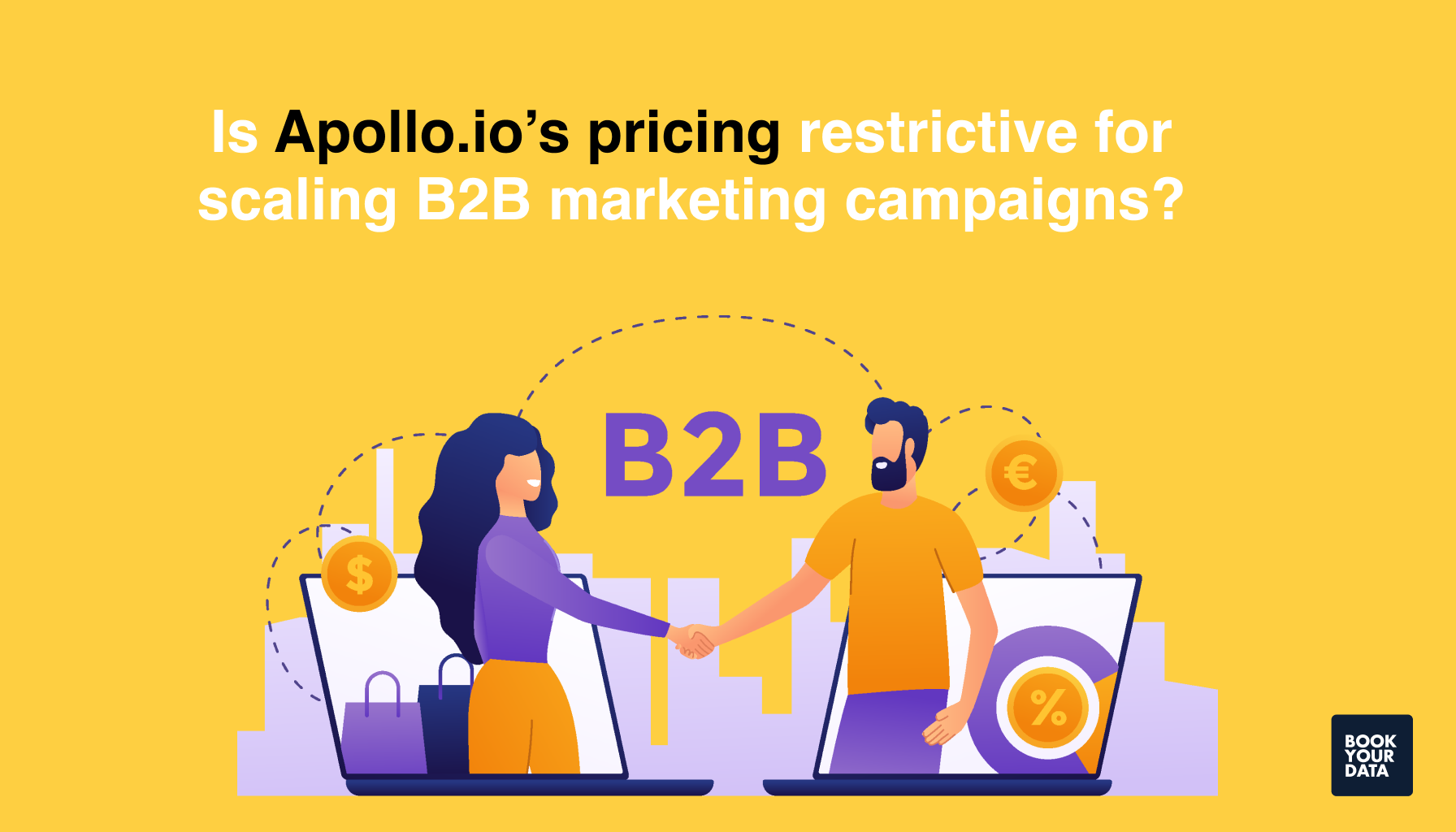
Yes, Apollo.io’s pricing can be restrictive for scaling B2B marketing campaigns for some teams. Apollo.io offers competitive pricing at the entry level, but its credit-based system and feature limitations on lower plans can be restrictive for businesses that want to do prospecting on a large scale.
Is Apollo.io a cheaper alternative to ContactOut for LinkedIn prospecting?
Yes. Apollo.io is a cheaper alternative to ContactOut for LinkedIn prospecting as it provides more features and contact access at a lower price point than ContactOut. ContactOut focuses more on email discovery, but Apollo.io includes a large set of tools like outreach automation, CRM integrations, and lead scoring at a lower monthly cost.
Is Apollo.io more cost-effective than ZoomInfo?
Yes, Apollo.io is considered to be more cost-effective than ZoomInfo, especially for small and mid-sized businesses. When it comes to ZoomInfo vs Apollo.io, ZoomInfo’s pricing is high and is generally custom-quoted, but Apollo.io offers more affordable and flexible monthly plans with solid features and data coverage.
[CTA1]
[CTA2]











